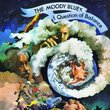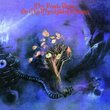| All Artists: Moody Blues Title: Every Good Boy Deserves Favour [MFSL Audiophile Original Master Recording] Members Wishing: 9 Total Copies: 0 Label: Mobile Fidelity Release Date: 9/12/1995 Album Type: Gold CD, Original recording remastered Genres: International Music, Pop, Rock, Classic Rock Styles: Europe, Britain & Ireland, Soft Rock, Oldies, Progressive, Progressive Rock, Psychedelic Rock, Album-Oriented Rock (AOR) Number of Discs: 1 SwapaCD Credits: 1 UPC: 015775164321 |
Search - Moody Blues :: Every Good Boy Deserves Favour [MFSL Audiophile Original Master Recording]
![Every Good Boy Deserves Favour [MFSL Audiophile Original Master Recording]](https://nationalbookswap.com/cd//l/46/7246/13107246.jpg) | Moody Blues Every Good Boy Deserves Favour [MFSL Audiophile Original Master Recording] Genres: International Music, Pop, Rock, Classic Rock
|
Larger Image |
CD DetailsSimilar CDs
|
CD ReviewsThe Most Progressive Moody Blues Release Lonnie E. Holder | Columbus, Indiana, United States | 04/09/2006 (5 out of 5 stars) "This CD is likely the least well-known of the classic 7 Moody Blues releases. This CD is also likely the most progressive and experimental of the classic 7, which is saying a lot considering how well regarded "Days of Future Passed" is as one of the first, if not the first, rock concept albums, and one of the first progressive rock albums. As with most of The Moody Blues first 7 albums, this CD also has a concept, albeit a somewhat loose concept. In this case, the concept is the evolution of man and his society, and whether and how that society might survive. As you can imagine, the tone of the album is relatively downbeat and somber. The opening track is perhaps the most progressive Moodies track of any Moodies album, "Procession." This song is nothing less than the encapsulation of the evolution of man from man's primate ancestors to today. This song is one of those that have earned The Moody Blues comments such as heavy-handed, pretentious and overblown. Certainly the song attempts to summarize our history with three words: desolation, creation and communication. The music that goes with these three little words is nothing less than art, simple, building in complexity as the piece progresses until the last moments in the song when the song becomes crescendos of guitars, organs and drums, underscoring the complexity of modern life, leading into the next number. While the next song, "The Story in Your Eyes", seems to try to dispel the downbeat opening, the lyrics have the stanza: But I'm frightened for your children That the live that we are living is in vain And the sunshine we've been waiting for Will turn to rain These lyrics add to the general gloom of the opening number, and furthering the theme of the album, which is whether mankind will yet survive. While the lyrics have their downbeat portions, the music is fast and is the song that is closest to mainstream rock on this album. This song was also the one chosen to be the single released from this CD. The next song is one of Ray Thomas' mellow numbers, but again the lyrics include hints of a darker future: Wonder why we try so hard Wonder why we try at all You wonder why the world is turning around When in the end it won't matter at all Before you get the feeling that you should just lie in bed for the rest of your life comes "Emily's Song," which was written about a baby girl. This song is again mellow, a fairy tale of song. There is chamberlain and percussion to give a vaguely cheery lullaby feeling to this song. The most charming theme is that by living through our children we gain a perspective on the world that we've lost as adults (so true!). The song suggests that we can regain what we've lost by being with our children, and letting them pull us into their world. Is it any wonder that grandparents like grandchildren? "After You Came" is a fascinating song when viewed in the perspective of previous Moodies albums. The song seems to suggest that many of the otherworldly lyrics from the previous Moodies albums were unrealistic, and the Moodies, as well as their listeners, needed to regain their earthly perspective. This theme was even more explicitly captured in the lyrics of the next album, "Seventh Sojourn," as the Moodies worked harder to undo the sometimes cult following the achieved due to their intensely spiritual earlier albums. Just when you think the album is heading somewhere upbeat comes "One More Time to Live", a reprise to the first song "Procession," detailing the host of man's sins and emotions, trying succinctly to express all the things that man could think, and perhaps should think, but also perhaps realizing that the solution requires philosophies and determination that can not be revealed in a simple song. Before the album takes itself so seriously that you achieve a dire funk, "Nice to Be Here" gives us a fantasy to relieve the stress of thinking too deeply. Ray Thomas has a penchant for creating songs like this one, which are one part childhood fantasy, one part philosophy, and one part longing for escape, a cute and clever song that somehow fits. The last two songs on the CD seem to relate to each other, and though they are sung in a mellow, almost downbeat, fashion, the lyrics suggest a way out for mankind. "You Can Never Go Home" by Justin Hayward is full of soaring instruments and vocals, and tells us that we are another step toward the future. The song is a love song, but it is a love song with dual meanings that fit into one person's love, and the meaning that love has for the future of man. "My Song" by Mike Pinder is a fitting conclusion to this album, and makes you wish the album would have gone on for another disk. Mike sings: Where did I find all these words Something inside me is burning There's life in other worlds Maybe they'll come to earth, Helping man to find a way. Mike's other lyrics suggest that he is having a hard time telling us all his thoughts and concerns, and he's ready to take any help to sort it all out, even if it's those extraterrestrials that so many of us talked about in the late 60s and early 70s. This album has never been considered a "great" album. Yet, the album tries to explain where mankind is, how we got here, and perhaps, where we might go. Only a group like The Moody Blues could tackle such an impossible subject in a mere 40 minutes. If you are feeling heavily introspective and mellow, and you are looking for mood music, spin this CD, and you'll find that 40 minutes just wasn't enough. " An antidote to cynicism Lonnie E. Holder | 04/20/2000 (4 out of 5 stars) "To be a Moody Blues fan, world-weary, jaded eyes must be forgotten. The band's greatest strength, and the one thing that most sets them apart from their contemporaries, is the fact that they write from a childlike perspective--honest, hopeful, and free of cynicism. "EGBDF" is a thematic album, very similar in construction to 1969's "To Our Children's Children's Children." But whereas "Children's Children" has the feel of "2001: A Space Odyssey," "EGBDF" has more the feel of an English garden. "The story in your eyes" is the only hit off the album, but all the songs are wonderful, and the album was meant to be enjoyed as a whole. "Emily's Song" is a charming love song from a parent to a young child. "One more time to live" is the only political song on the album, yet is more poetry than protest. "Nice to be here" by Ray Thomas is a rollicking, colorful children's song, a good companion piece to "Floating" from the Children's Children album. The best treat on this album, though, is Justin Hayward's "You can never go home," which contains some of the best lyrics he's ever written, perfectly accented by his plaintive vocals. Finally, Michael Pinder's "My song" serves as a satisfying epilogue to the rest of this lovely album.Anybody who likes the Moody Blues, or just desires a change of pace from the heavy beats and angry cynicism of today's music, would be well-advised to buy this album.As a footnote: Young people today will never know one of the greatest pleasures that came from owning vinyl albums: Cover Art! And the Moodies' were the best. The cover for "EGBDF" was adapted (I'm pretty sure) from a watercolor painting called "Der Krystal" by the German artist Sulamith Wulfing." This is a great CD! Lonnie E. Holder | 03/13/2000 (5 out of 5 stars) "Can't say much except that this is a great CD! I doubt that this review would even be helpful to anyone but all I can say besides getting it is that it comes highly recommended! Some may not like it but it hardly deserves only 1 star and if you do rate it as 1 star, you are either very pretentious or just ignorant to good music. Maybe one should start getting britney spears instead?"
|

 Track Listings (9) - Disc #1
Track Listings (9) - Disc #1

